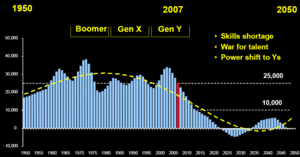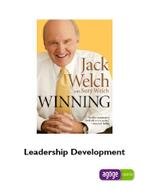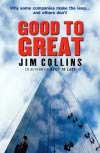OK I admit it; I have been more than a little bit sceptical of the Generation Y buzz that has been around for the last few years. I have openly wondered if it is all just an excuse for a lack of discipline and hard work.
To be honest I didn’t really understand the link between the baby boomers, Gen X (of which I am a member) and Gen Y. My view changed somewhat when I saw this graph from Bernard Salt at The Knowledge Gym.
 click to picture to enlarge
click to picture to enlarge
It shows the net growth in the working aged population over a 100 year period. Bascially there is a decline in people joining the work force over the next 20 years as the Baby Boomers retire. Less people joining the work force and a growing economy simply don’t go together.
Bernard says that Gen Y’s are experiential, ethicists, uncommitted to career and consumerists. They have matured in prosperous times which means they have often received most of what they asked for.
Characteristics of Generation Y
- Born 1976-1991 … now aged 16-31
- Matured to adulthood in prosperous times
- Many live at home with mum & dad
- Very loyal to friends, to workmates, not to employers
- Prefer ‘deals’ not contracts and ‘mentors’ not bosses
- Will Inherit boomer wealth
- Technology savvy; global thinking
- They are the most educated generation to date.
So what does this mean to the Logistics industry in New Zealand?
Get used to immigrants.
Firstly we had better get used to immigrants filling the gaps. Most developed nations, except India, are going to have a labour shortage. A lot of our young talent will move off shore as huge Multinationals do recruitment drives down under. We will be able to attract people to NZ for lifestyle, but that means immigrants from countries where English is a second language.
I think that a lot of logistics and warehousing businesses understand this already, whereas transport companies seem a lot more reluctant to employ immigrants.
Get creative to attract Gen Y
Our industry will need to be a lot more creative about attracting Gen Y’s. They are not generally going to want to drive a truck for 60 hours a week. They will find pick/pack work dead boring. Most of all they will change jobs often and we may not been seen as edgey enough. The majority will head to Uni which will make it hard to attract them into a semi-skilled job.
We can no longer afford to just impose our current standards of employment on them. If we do they simply will not come.
There are a difficult few decades for the Gen X’s, like myself, to adapt and retain and lead the Gen Y’s. We need to take action now or we may not stand a chance.
 I remember it because it was the 8th of 8, 88.
I remember it because it was the 8th of 8, 88. 

 1. Preferred employers demonstrate a real commitment to continuous learning.
1. Preferred employers demonstrate a real commitment to continuous learning. 